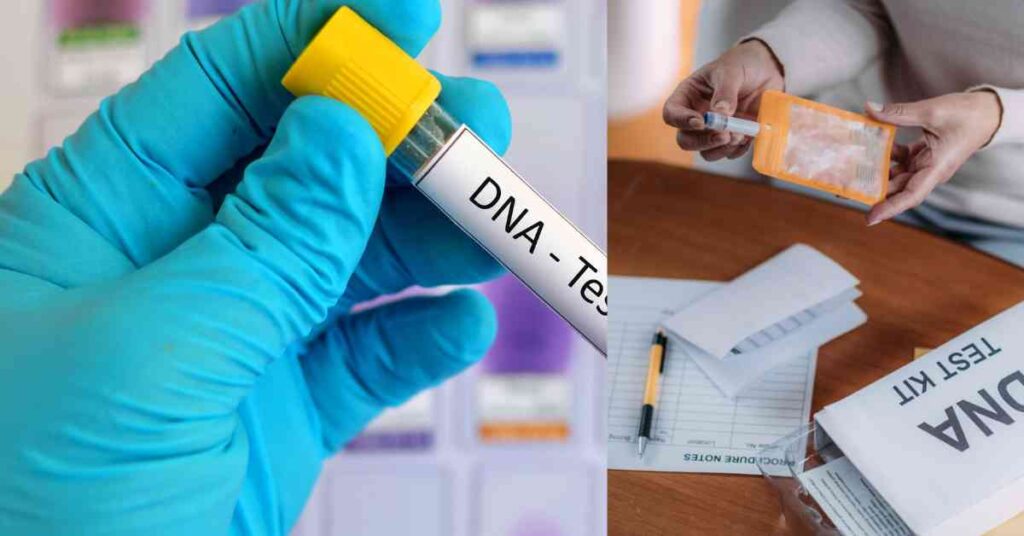Many people in Nigeria think that getting a DNA test is pricey. You may be asking what the price of a DNA test is in Nigerian hospitals in 2024. To answer your question, DNA tests can cost anywhere from N250,000 to N1,500,000, based on the type of test you want to get.
DNA tests look at your Deoxyribonucleic Acid (DNA), which is like a blueprint and stores all of your genetic information.
This detailed guide will explore the various kinds of DNA tests, how much they cost in 2024, and the factors that affect these prices.
Also see: Prices of wheelchairs in Nigeria:
What Is the Cost Of DNA Test In Nigeria 2024?
In 2024, a DNA test in Nigeria can cost anywhere from N1250,000 to N600,000.
This price range is for the most popular type of DNA test, which is a paternity test.
The exact price of a DNA test can change based on the testing laboratory and the type of DNA test you need.
The table below is a representation of various types of DNA test and their prices.
| TYPE OF DNA TEST | PRICE RANGE |
| Paternity DNA test (Peace-of-mind Test) | N250,000 to 600,000 |
| Legal Paternity Test | N400,000 to 600,000 |
| Family Relationship Testing (siblings, grandparents, aunts, and uncles.) | N400,000 to 500,000 |
| Immigration DNA test | N300,000 to 600,000 |
| Pre-Natal DNA test | N900,000 to N1,500,000 |
| Genetic disease risk test | N250,000 to 500,000 |
| Identity Test | N400,000 to 800,000 |
| Maternity Test | N300,000 to 600,000 |
For paternity DNA tests, additional costs attract every child, but at a reduced amount, in most DNA centers in Nigeria.
Cost Of DNA Test In Abuja
In Abuja, DNA testing is more costly than in Lagos and other cities since, among other things, only the most prestigious hospitals and laboratories offer this service. Depending on the specific DNA test you select, the price tag could range from N350,000 to N2,000,000.
Cost Of DNA Test In Benin City
Since various average laboratories and hospitals do DNA testing in Benin City, the cost of the test is comparatively lower; depending on the particular kind of DNA testing you want to do, you should budget between N250,000 and N1,500,000.
Cost Of DNA Test In Port Harcourt
In Port Harcourt, the cost of a DNA test is on the high side, and you can expect to pay between N350,000 and N700,000 for a paternity test, depending on the hospital or lab you are using.
Please be aware that the lab you visit and the specific test you require can cause these prices to differ.
Therefore, it is recommended that you seek quotations from multiple labs if you are interested in having a DNA test done.
Types Of DNA Tests in Nigeria
As you could see from the table above, the price of DNA test in Nigerian hospitals 2024 depends on the types of DNA.
There are several types of DNA tests; however, DNA tests can be broken down into two main categories in Nigeria: relationship DNA tests and ancestry DNA tests.
Relationships DNA Tests
These types of DNA tests are used to find out if persons are biologically related to each other. Most of the time, these tests are used to find out who the father is, which is called paternity test, but they can also be used for other things, like
Maternity testing:
This test can be used to find out if someone is the birth mother of a child.
Siblingship testing:
This test can be used to find out if two people are related, that is, if they are biological siblings.
Grandparentage testing:
This test can be used to find out who a child’s real grandparents are.
Avuncular testing:
This test can be used to find out if someone is someone else’s real aunt or uncle.
Immigration DNA tests:
Sometimes, this kind of test is needed to show a direct connection for immigration reasons. It is required by immigration as proof of a person’s biological relationship.
Paternity Test:
This test is used to find out if a man is the actual father of a child. To find out who the father is, you can use blood, an oral swab, or sperm.
Ancestry DNA Tests
People take Ancestry DNA tests to find out about their genetic background.
These tests look at a person’s DNA to find out what race they are and to find possible genetic cousins.
For people who want to learn more about their family background, Ancestry DNA tests can be very helpful.
There are three main types of DNA tests for ancestry:
Autosomal DNA testing:
Most people who want to find out about their ancestry use autosomal DNA tests. It looks at all 23 genes of a person’s DNA.
Y-DNA testing:
This kind of test only works on male ancestors and can be used to find out where someone’s father came from.
Mitochondrial DNA testing:
This kind of test can be used to find out who someone’s mother is and how they got their DNA.
Other Types Of DNA Testing
Genetic disease risk test
Researchers use this test to find out if a person is more likely to get a certain genetic disease. Gene risk tests can be done with either a blood sample or an oral swab.
Identity Test
One can use this test to find out if someone is who they say they are. An identity can be verified with a blood sample, a cheek swab, or a strand of hair.
Forensic DNA test:
In criminal investigations and court cases, this kind of DNA testing is used to find out who someone is or to find links between DNA data and suspects or victims.
What Is The Procedure For DNA Testing In Nigeria?
To get started with DNA testing, you will have to collect samples. Collecting samples is done in two ways: either you walk into the clinic or lab, or you do it at home yourself.
Let us look at how you can collect samples yourself at home.

DNA Sample Collection at Home
The lab or courier will send you the DNA sample collection kit, which you will use to collect samples.
Taking your DNA sample at home requires that you carefully follow the given directions on the DNA Testing Kit.
Procedure For Collecting Sample With Buccal Swabs
- Slide the Kit open. Remove them from the sterile packaging, being careful not to touch the swab tip.
- To collect cheek cells, roll the swab tip inside the right and left cheeks for more than a minute.
- Swabs should be carefully placed, tips facing up, in an empty glass. Neither of them ought to come into touch. After that, give the swabs ten minutes at room temperature to air dry.
- Putting the tip end inside, place the dried swabs in the sample envelope.
- Applicants need to double-check that all the documents and envelopes used to gather DNA samples are filled out and signed before they can move forward. Finally, in the lab’s pre-signed return envelope, put all the necessary paperwork and seal the envelope.
Immediately following the collection of your sample, it will be transported to a laboratory for analysis.
Your DNA test results will be sent back to you within a few weeks of the test being completed.
Where Can You Do A DNA Test In Nigeria?
Places in Lagos You Can Do DNA Test
- DDC | DNA BioScience Center
- Smart DNA
- Lagos State DNA & Forensic Center (LSD&FC)
Places In Abuja You Can Do DNA Tests
- Vinette Hospital
- Scantrik Diagnostics and Healthcare Ltd
Places In Benin City You Can Do DNA Tests
- Scantrik Diagnostics and Healthcare Ltd
- Vicsly healthy Medical Laboratory.
Places In Port Harcourt You Can Do DNA Tests
- Cometwellness Diagno-Clinic
Is There Any Risk Associated With DNA Testing?
Some risks come with DNA tests, but most of them are not physical.
Let’s have a look at some of them below:
Emotional and mental health risks
The results of a DNA test may come as a surprise or be hard to deal with mentally. One example is that paternity tests might show cheating or a different biological father than what was thought.
Ancestry tests can help you find cousins or ethnic backgrounds you didn’t know about.
Before taking a test, you should think about how you might respond to the results.
Privacy Concerns
Clinics and labs that do DNA tests keep track of your personal information. There is always a chance that your information could be stolen or used without your permission, even though reputable hospitals and labs have strong security measures in place.
Results may not be 100% accurate.
DNA tests may not be 100% accurate and can have limits. Ancestry tests might not give you a full picture of your family tree, and they might not find some genetic conditions or give you only partial information.
Tests may not always be able to tell how bad a disease will be or how likely it is to happen.
Family Strain
Test results can reveal family secrets or past secrets that have been kept secret, which could make families fight.
It is a good idea to talk about the chance of unexpected results with family members who might be affected ahead of time.
In general, DNA testing can be helpful, but you should think about the pros and cons before choosing to go through with it.
Which Hospital Is The Best For DNA Tests in Nigeria?
Concerning DNA testing, the Lagos State DNA & Forensic Center (LSD&FC) appears to be at the top of the list.
Modern infrastructure and technology are features of the LSD&FC that guarantee precise and trustworthy results.
Larger cities like Abuja, Port Harcourt, and Benin City have other excellent DNA centers.
Conclusion
To unlock your ancestral tapestry, confirm biological connections, and learn important things about your health potential, Nigerian DNA testing is the way to go.
You can start your DNA-driven journey of self-discovery by learning about price of DNA test in Nigerian hospitals or labs, the different types of tests that are available, and how important things like privacy and the risks involved in DNA testing.
If you find the article “Price Of DNA Test In Nigerian Hospitals 2024” interesting, kindly subscribe to our OgaPrice’s new letter below for updates on current prices.
- Current Price Of Tokunbo Toyota Venza Engine In Nigeria - November 14, 2024
- Prices Of The Best Natural Hair Products in Nigeria - October 31, 2024
- Current Price Of Tokunbo Mercedes-Benz GLK-Class Engine In Nigeria - October 26, 2024

